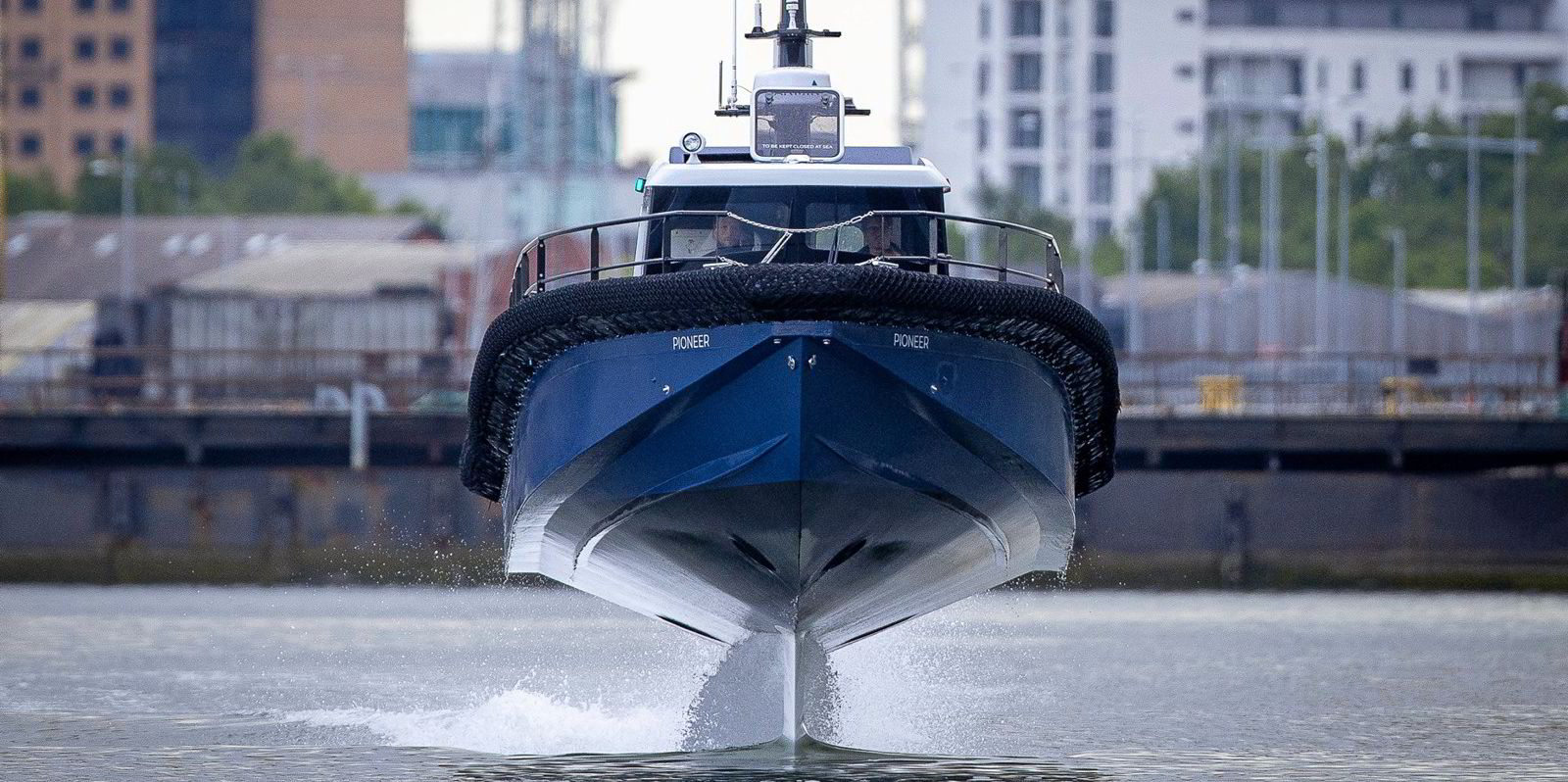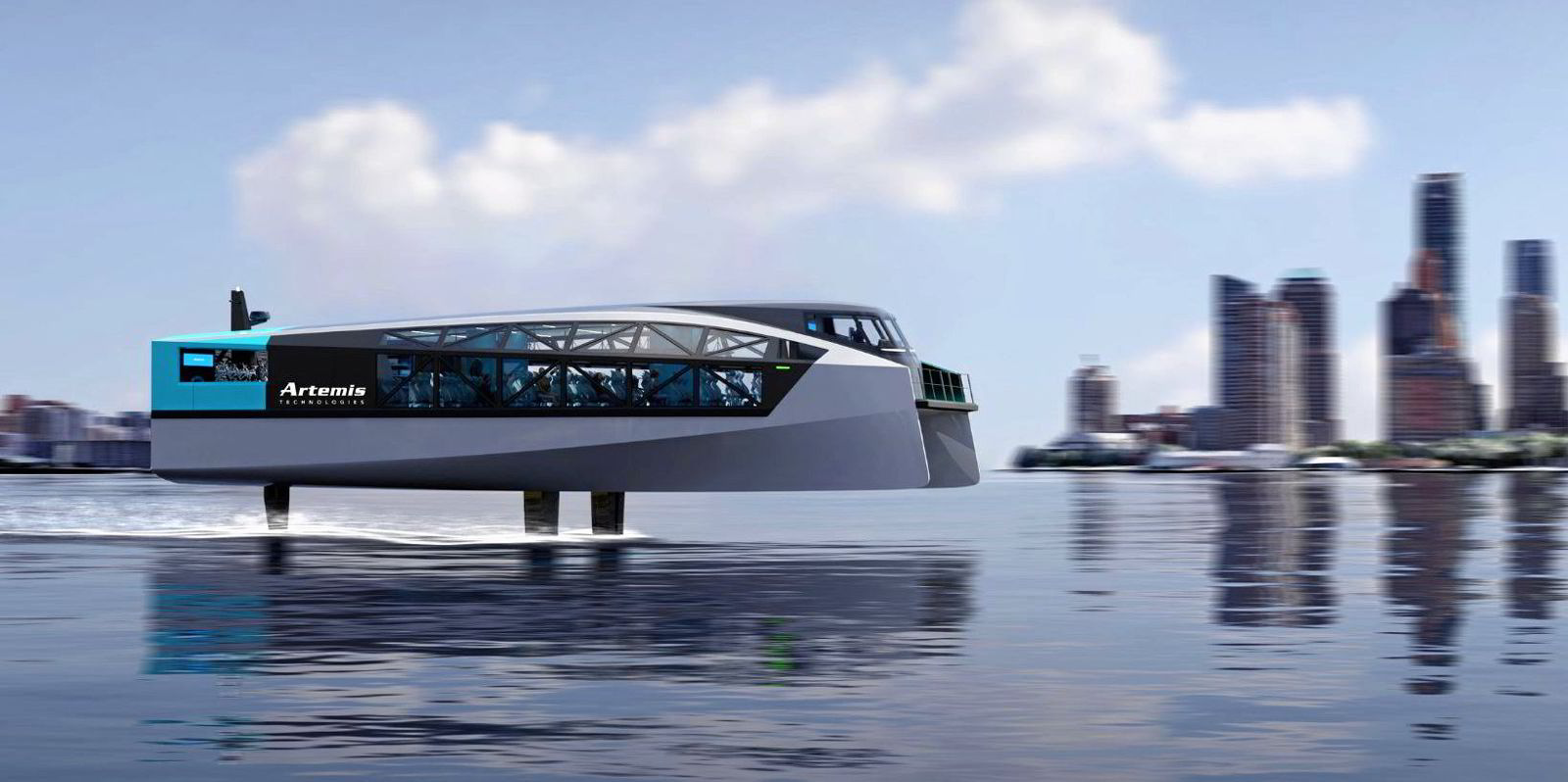Companies developing technologies to allow vessels to ‘fly above water’, burn hydrogen and ammonia or use wind for propulsion are sharing a £60m ($73m) green maritime funding pot from the UK Government.
Transport secretary Mark Harper visited Artemis Technologies which is developing the world’s first 100% electric high-speed foiling passenger ferry in Belfast as part of the announcement.
Artemis will use the funding to help take its Multipurpose eFoiler Platform to commercial scale. It allows electric hydrofoil vessels to produce zero emissions and make energy savings of up to 90% when the foils lift them up to ‘fly’ above the water.
It is developing a project to deploy a 12m e-hydrofoil offshore wind crew transfer vessel and a first electric 150-seat ferry will be operated by Condor Ferries from 2024 along Belfast Lough from the city to Bangor within 25 minutes.
The funding over a two-year period comes from the third round of the Government’s Clean Maritime Demonstration Competition (CMDC3) which aims to help develop a range of clean maritime technologies.
Other winners include projects to build and test electric ferries, hydrogen-powered vessels and demonstrate full-sized prototypes of wind-assisted ships.
Harper said the government aims to ensure the UK is a pioneer in clean maritime solutions as part of its efforts to grow the economy.
“The funding we’re awarding today will help to do just that, bringing emission-free concepts to life and fuelling innovation,” he said.
The list of other winners includes:
The Carnot High Efficiency Hydrogen Combustion Engine Demonstrator will develop and run a hydrogen engine for sea trials on a ship capable in future of being used to power vessels from tugs to tankers.
The Winds of Change project, led by Smart Green Shipping Alliance, is translating yacht racing technology to large-scale commercial shipping with a wind-assisted 20 metre high ‘FastRig’ on a vessel.
The Pioneering Onboard Carbon Capture pilot project led by Seabound Carbon is a first full-scale demonstration of a new approach to carbon capture onboard an ocean-going vessel which will capture about 30 tons of CO2 emissions per day.
The Zero Emission Solent Tri Foiler project, led by Chartwell Marine, is looking to develop an electric hydro-foiling high-speed boat, capable of carrying up to 40 people on coastal routes.
The High Power Electric Offshore Charging Demonstrator led by Jebb Smith will install a power buoy supplied from a nearby wind turbine in the European Offshore Wind Demonstration Centre in Orkney to recharge electric crew transfer vessels.
The Electric Seaway (TES) project, led by Aqua superPower, will provide a 100% electric charging infrastructure to enable future green corridors between ports along the UK’s south coast.
Wings for Ships led by Wing Tek will demonstrate two full-size prototypes of a rigid Wingsail System to accelerate the deployment of wind auxiliary propulsion on large commercial vessels.
The Clean Hybrid Alternative Marine Powertrain (CHAMP) 2 project, led by Mathwall Technologies, will take forward a prototype vessel to be tested in multiple real-world environments.
A demonstration of a symbiotic wind propulsion and carbon capture system led by Windship Technology will demonstrate how bulkers and tankers fitted with conventional diesel engines can use wind propulsion and carbon capture to get to zero emissions.
The Hydrogen Innovation — Future Infrastructure & Vessel Evaluation and Demonstration project, led by Acua Ocean is for a shoreside mobile hydrogen bunkering station and a zero-emission hydrogen-powered vessel between Aberdeen and The Shetland Islands.
Wightlink Net ZERO led by Helix Renewable Energy Services will demonstrate clean shore power charging technologies for a fully electric daily passenger ferry service.
The TransShip II - RV Prince Madog Hydrogen Retrofit led by OS Energy (UK) aims to realise the largest retrofit to date for a hybrid, hydrogen-based propulsion system on a seagoing vessel by replacing the auxiliary drive.
The Zero Emission Cross River Ferry led by Collins River Enterprises will design and build a new 100% electric ferry for the River Thames and construct infrastructure to support it.
A Retrofittable Propulsion System for Electric Vessels with Hydrogen Range Extender will deploy a combined battery and hydrogen internal combustion engine on a crew transfer vessel, led by AceOn Battery Solar Technology.
A demonstration of direct ammonia fuel cells for maritime propulsion by ZEM Fuel Systems will develop the electrical system and operational parameters for on-vessel and shoreside implementation of direct ammonia fuel cells.
The Coastal Workboats: E-LUV project, led by Coastal Workboats, will demonstrate a fully electric inter-island workboat in the Shetland Islands running a 45-minute journey twice daily.
The MorVoRen (Moored Volts from Renewables) & Mermaid project led by Marine Zero will deliver a fully electric passenger vessel to operate in Falmouth, Cornwall plus charging infrastructure.
CMDC funding comes from the wider £206m UK Shipping Office for Reducing Emissions (UK SHORE) scheme announced in March 2022.
Last week the Government also launched the Zero Emission Vessels and Infrastructure competition to support projects in the latter stages of development, and the Clean Maritime Research Hub – aimed at the early science and research behind green technology.





